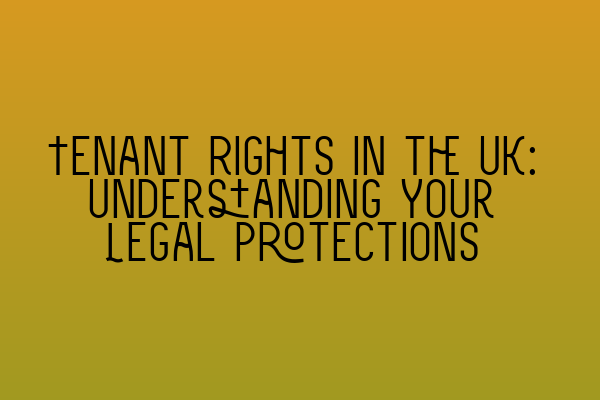Tenant Rights in the UK: Understanding Your Legal Protections
As a tenant in the UK, it’s crucial to understand your legal rights and protections. Renting a property can be an exciting but challenging experience, and having a clear understanding of your rights can help you navigate any potential issues that may arise during your tenancy. In this blog post, we will explore the various tenant rights in the UK and provide you with the information you need to know.
1. The Right to a Written Tenancy Agreement
A written tenancy agreement is a legally binding document that outlines the terms and conditions of your tenancy. It’s essential to ensure that you have a written agreement in place, as it provides clarity and protection for both the tenant and the landlord. If you don’t have a written agreement, it can be challenging to enforce your rights or resolve any disputes that may arise.
2. The Right to a Safe and Habitable Property
As a tenant, you have the right to live in a safe and habitable property. This means that the property should meet certain minimum standards, such as having a working heating system, secure doors and windows, and proper sanitation facilities. If your property does not meet these standards, you have the right to report the issue to your landlord or local authority.
3. The Right to Quiet Enjoyment
One of the essential rights of a tenant is the right to quiet enjoyment of the property. This means that you have the right to live in the property without any interference or harassment from the landlord. If your landlord repeatedly enters the property without your permission or engages in any behavior that disrupts your peaceful enjoyment, you can take legal action to protect your rights.
4. The Right to be Protected from Unfair Eviction
Under UK law, landlords cannot evict tenants without following the proper legal procedures. They must provide a valid reason for eviction and give notice in writing. If your landlord tries to evict you without proper cause or fails to follow the correct eviction process, you have the right to challenge the eviction in court.
5. The Right to Protection from Discrimination
As a tenant, you have the right to be free from discrimination based on factors such as your race, gender, disability, or religion. Landlords cannot refuse to rent to you or treat you unfairly because of these protected characteristics. If you believe you have been a victim of discrimination, you can seek legal advice and potentially file a complaint with the appropriate authorities.
6. The Right to the Return of your Deposit
When you rent a property, your landlord will typically ask for a security deposit. This deposit is meant to cover any damages caused by the tenant and is held in a tenancy deposit protection scheme. At the end of your tenancy, your landlord is required to return the deposit to you, minus any deductions for damages. If your landlord fails to return your deposit or unfairly withholds a portion of it, you have the right to dispute the decision.
In conclusion, understanding your tenant rights is crucial for a smooth and secure tenancy. By knowing your legal protections, you can confidently assert your rights and address any issues that may arise during your rental period. If you have any questions or concerns about your rights as a tenant, it’s always a good idea to seek legal advice from a qualified solicitor who specializes in property law.
To further enhance your knowledge about contract law and your rights and responsibilities as a tenant, we recommend exploring the following related articles:
– Understanding Contractual Capacity: Rights and Limitations
– Interactive SQE Mock Tests for Contract Law: Test Your Knowledge
– Join Our SQE Contract Law Webinars: Expert Insights and Guidance
– Contract Law Reforms: An Analysis of Recent Changes
– Parties in a Contract: Rights and Responsibilities
Remember, being well-informed is the first step towards protecting your rights as a tenant.
